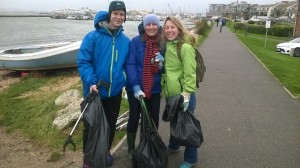Part of our  communal life ever since we started in 2009 has been the practice of beach cleaning. It is now our pattern one Sunday a month to gather on the shore near Poole quay and litter pick the beach. That gathering is our only gathering of the day. It is our service. It is our worship.
communal life ever since we started in 2009 has been the practice of beach cleaning. It is now our pattern one Sunday a month to gather on the shore near Poole quay and litter pick the beach. That gathering is our only gathering of the day. It is our service. It is our worship.
When we explain this practice to people, particularly church-going people, it inevitably causes a reaction; a raised eye-brow, a look of confusion, or concern, or worse. So why do we clean the beach? Here are 5 reasons;
- Stewarding creation.
Part of our call as human beings is to steward creation (Gen 1: 18, 2:15). Creation is not a blank canvas for us to play with. Nor is it a mine for us to plunder for our own benefit. It is the vibrant, living system into which we are placed in order to give us life, but with a caveat, that we will participate in its continued health and life-giving sustainability. In a small but significant way we model this stewarding of creation as we clean the beach monthly. The marine environment is a key part of the life of our town, a basis for the lives of a great many people, those who go to sea for a living as well as those whose businesses are connected to seafaring. Tourism also bring huge numbers of people to Poole, the sea being a key attraction. So in cleaning the beach we actively demonstrate our stewarding of the marine environment. We don’t hope or expect this to be the sum total of our action in this regard. We hope that this monthly act together reminds and inspires us to be good stewards of creation in every aspect of our lives.
- Worship as an expression of orthopraxy
The church’s worship is usually associated with certain practices within a church building on a Sunday morning. We take communal worship of this kind seriously too and make it an important part of our rhythm of life as a community. However, we also recognize that the biblical understanding of worship is a holistic one, where practices designed to affirm and develop our personal and communal belief (orthodoxy) are intrinsically connected to practices that live that out in the world (orthopraxy).
Paul tells us to ‘present your bodies as living sacrifices…which is your spiritual act of worship’ (Rom 12:1). Every part of us, mind body and soul, is to be expressed in lives of worship. So for us it seemed important not just to affirm that verbally as a community, but to action it within the rhythm of our communal life.
- Holiness as a positive declaration
We believe that the call of the church is to live lives of holiness amidst the culture of its time (1 Pet 2:11). Too often the church has assumed a position of power from which it has acted as a moral judge and arbiter in society. Having largely lost this position of moral authority its reputation in much our society is one of kill-joy and policeman. We are understood far more for what we are against than what we are for.
Yet, whilst the call to follow Jesus and to live obedient lives in the world does cause us to refrain from certain practices, it also inspires a joyful commitment to lives of positive engagement in the world. We want the church to be know far more for what it is for than what it is against. And in a culture jaded and weary of moral and ethical authorities of whatever kind, the most powerful declaration of this way of life is through demonstration.
- Christian practice as a means of invitation into the Kingdom
The default pathway of invitation into the Kingdom of God has generally been one that focusses on right belief at the threshold of entry into the community. Belief, leads to belonging, which in turn leads to right behaviour: belief – belong – behave.
In an increasingly postmodern and sceptical age, and recognising the radical inclusiveness of Jesus’ ministry, many communities have explored hospitality as a means of enabling people to be part of Christian community. This initial belonging leads to deepening relationships and a journey toward faith. Thus: belong – believe – behave.
What we see in the beach cleaning, and in other things we do, is an invitation to Christian practice, one that models something of the Kingdom, and one which people can participate in. The development of belonging takes place here too, but in a way in which the gospel is already on the agenda, already being quietly proclaimed. In that sense we offer a journey that looks more like: behave – belong – believe.
Interesting to note that perhaps this is also the journey of the gospels, where for example in Matthew the Sermon on the Mount comes as the early manifesto for the emergent community of Jesus. This call to a radical expression of Godly behaviour is also a call to belonging in community, which eventually led to belief.
- Church practice that doesn’t wear everyone out
One of our key values as a community is to ensure that the energy and effort required to sustain our communal life is simple enough that we are not worn out by it. Cleaning the beach is simple, and above all free. After an initial input of resource to set it up the practice pretty much runs itself.
Research into the many people who have left church and yet maintained a faith has shown that one of the key reasons for leaving church is that it was simply wearing them out. People did not have time for other relationships, or simply for themselves and their families.
Alan Hirsch speaks of many congregational churches as ‘extractional churches’. In other words, involvement in these often large and busy congregations requires so much time and energy from us that we find ourselves being extracted from networks of relationships outside of church. All our friendships soon turn out to be with people from church.
If we are truly to be missional communities, fulfilling our call in a largely sceptical and agnostic culture, we need to orient the practical demands of our communal lives in order that people still have plenty left for imaginative missional uses of their times and resources.

